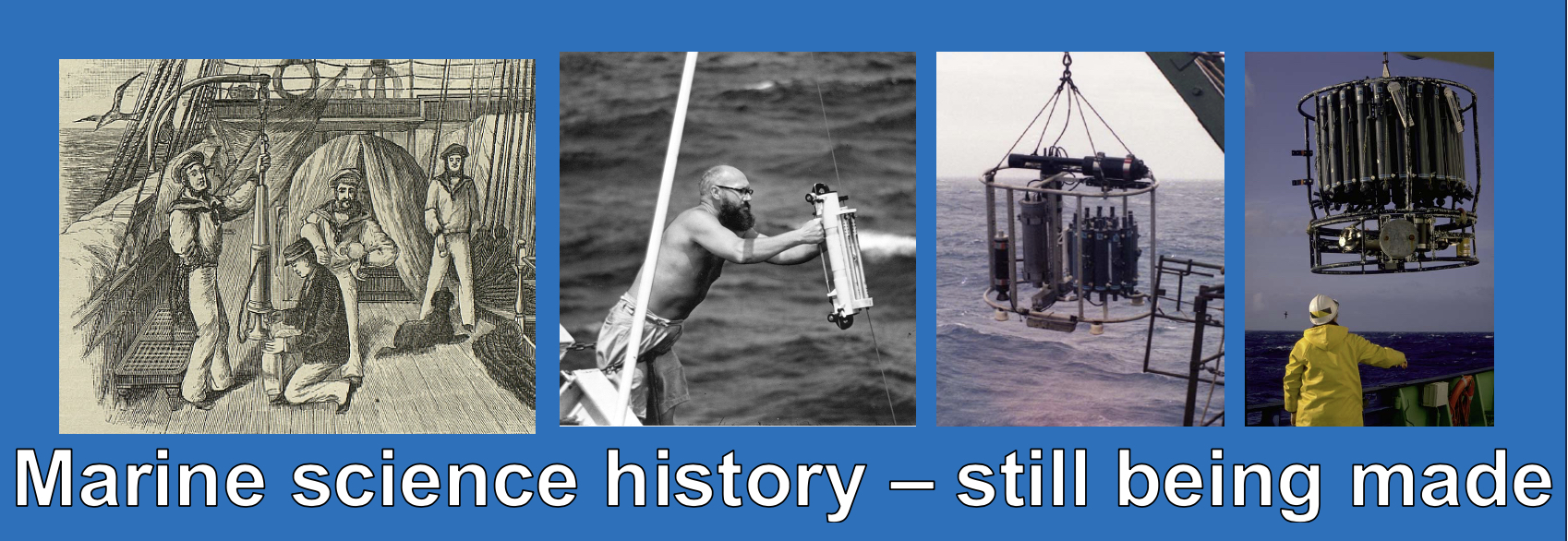History of Marine Science SIG
The Challenger Society’s name and its origins derive from the expedition that is acknowledged to mark the start of the systematic study of the oceans on a global scale. The scientific legacy of that expedition is found in the samples collected, the many volumes of Challenger Reports and the data they contain and in the extensive published literature about the voyage.
What is perhaps less well recognised is that the history of marine science spans the whole of the intervening 150 years. In particular the period since the 1950s has seen a revolution of our understanding of how the oceans and their complex ecosystems “work” and influence planet earth. Thus, the study of all aspects of how our present-day understanding of the oceans has developed fall within the remit of this SIG.
Methods of operation. The Group’s members use a JISCMail list to communicate by e-mail. They also communicate by online and occasional face-to-face meetings. Many contributions to the Society’s journal “Ocean Challenge” relate to historical aspects of marine science. The group’s interests are complemented by those of the Royal Meteorological Society’s SIG covering meteorology and physical oceanography. The two SIGs co-sponsored the November 2018 meeting “From HMS Challenger to Argo and beyond”.
Activities of the group’s members include, but are not confined to:-
- Encouraging research into the development of and contributions by UK marine laboratories and institutions.
- The analysis and re-interpretation of historical data and samples
- Ensuring that such data and samples are preserved and made accessible to researchers.
- The study of the development of historical instrumentation and observing platforms
- Researching and documenting the lives of those who have contributed to the development of UK marine science.
- Promoting the effective management and adequate resourcing of archives relating to marine science.
Resources and web sites
Many documents and artefacts relating to the development of ocean science are held in national and institutional archives, among the most important of which are :-
• Science Museum London and Wroughton (Search e.g. “oceanography”)
• Royal Museums Greenwich (Search e.g. “Challenger”)
• National Oceanographic Library Southampton
• History of the UK National Institute of Oceanography
Publications
The following are examples of publications on the history of marine science by past and present members of the Society.
• Rice, A.L. (1986). British Oceanographic Vessels, 1800-1950. The Ray Society.
• Deacon, M. (1997). Scientists and the Sea, 1650–1900: A Study of Marine Science (2nd ed.). Routledge. https://doi.org/10.4324/9781315243610
• Laughton, A.S.; Gould, J.; Tucker, M.J.; Roe, H., (eds.) (2010). Of Seas and Ships and Scientists: The Remarkable History of the UK National Institute of Oceanography 1949-1973. Cambridge, Lutterworth Press, 128-139, 360pp.
• Robinson, S. (2018). Ocean Science and the British Cold War State. London: Palgrave Macmillan, UK. 10.1007/978-3-319-73096-7.
• Griffiths, Gwyn (2020). Fifty years and counting: Applications of AUVs in the polar regions. In 2020 IEEE/OES Autonomous Underwater Vehicles Symposium (AUV) (pp. 1-6). IEEE. https://ieeexplore.ieee.org/abstract/document/9267951
• Woodworth, Philip L. (2020). Tide prediction machines at the Liverpool Tidal Institute. Hist. Geo Space Sci., 11, 15–29, https://doi.org/10.5194/hgss-11-15-2020.
• Pearson, Philip (2021). A Challenger's Song: the Challenger expedition and the life of a crewman, Charlie Collins. Austin Macauley. https://a-challengers-song.co.uk/
• Jones, Erika. (2022). The Challenger Expedition: Exploring the Ocean's Depths. London: Royal Museums Greenwich, 2022. 224 pp. $37.50 (paper), ISBN 9781906367978.
• Gould, W. J. (2022). HMS Challenger and SMS Gazelle – their 19th century voyages compared, Hist. Geo Space Sci., 13, 171–204, https://doi.org/10.5194/hgss-13-171-2022, 2022.
• Woodworth, Philip L.; Vassie, John M. (2022). Reanalyses of Maskelyne's tidal data at St. Helena in 1761. Earth System Science Data, 14 (9). 4387-4396. https://doi.org/10.5194/essd-14-4387-2022
• Gould, W John (2023). Pen portraits of Presidents - Prof. Henry Charnock, CBE, FRS. Weather, 78(10)
• Griffiths, G. (2024). AUVs Under Ice: A Four-Decade Retrospective on Strategy and Risk Through the Autosub Looking Glass. Marine Technology Society Journal, 58(1-2), pp.38-51. https://doi.org/10.4031/MTSJ.57.5.2
Latest News
Royal Society Publishing Photography Competition 2025
Please see a message from the Royal Society below:
We are delighted to announce that the 2025 Competition is now open for entries until 15 August for a chance to win £1000! The competition celebrates the power of photography in conveying the wonder of science happening all around us and photographs can be submitted in the categories of: Astronomy, Behaviour, Earth Science and Climatology, Ecology and Environmental Science, and Microimaging.
The competition is free to enter and open to anyone studying or working in science at graduate level or above. Category winners will receive a one-year membership to the Royal Photographic Society and the overall winner will receive a grand prize of £1,000. Find out more: https://bit.ly/RSPphotocomp
October 2025 MEDIN Workshop: Marine Data Management, Governance and the MEDIN toolset
The Marine Environmental Data and Information Network (MEDIN) are pleased to announce that registration is now open for the next occurrence of our popular free online training workshop: ‘Marine Data Management, Governance and the MEDIN toolset’ on the 13th – 17th October 2025 on OceanTeacher Global Academy.
Marine Data Management, Governance and the MEDIN toolset
The Marine Environmental Data and Information Network (MEDIN) and OceanWise are delighted to invite you to attend our popular free online training workshop: ‘Marine Data Management, Governance and the MEDIN toolset’ on the 19th – 23rd of May 2025.
